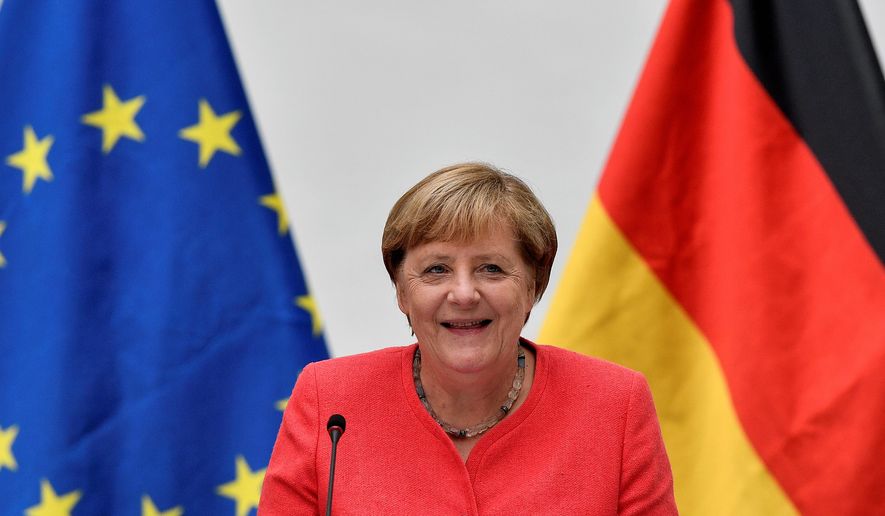President Trump may want to punish Germany for its defense spending shortfalls, but any move to pull thousands of American troops out of the country will not happen quickly.
As part of what the Pentagon says is a rethinking of U.S. troops levels across Europe, Mr. Trump has vowed to reduce the U.S. military presence in the country by about 12,000 to a level of 24,000. But foreign policy analysts said Tuesday said that was easier said than done, in a process that will likely prove expensive and logistically tricky.
The process will probably take “months to plan and years to execute,” said Rachel Ellehuus, deputy director of the Europe Program at the Center for Strategic and International Studies, citing Senate Armed Services Committee Chairman Jim Inhofe, Oklahoma Republican.
The 2nd Cavalry Regiment, currently based in Vilseck in northeast Bavaria, is slated to return to the United States under the Pentagon’s troop redistribution plan. It is the sole brigade-size ground unit left in Germany.
“The problem is, where do they return to? Is there housing? Are there schools? Is there health care?” Ms. Ellehuus said at a webinar Tuesday organized by the American Institute for Contemporary German Studies. “Particularly in a time of COVID, there could be real concerns.”
There are other difficulties — Italy is supposed to receive some of the U.S. troops from Germany but the country has a cap on the number of American military installations allowed within its borders.
“Public opinion in Italy may not necessarily be in favor of more U.S. forces,” Ms. Ellehuus said. “This could actually prove quite difficult.”
Secretary of Defense Mark T. Esper has said the move will improve “strategic flexibility.” Some of the troops are being deployed to other countries in Europe close to the border with Russia, such as Poland, which has made no secret of its desire to host American personnel.
Wolfgang Ischinger is a former German ambassador to the U.S. who now leads the Munich Security Conference. He acknowledged Berlin has yet to meet its NATO defense spending standard of at least 2% of GDP, but he also said the Kremlin was closely watching the NATO nations sort out recent tensions.
“Will [the Russians] look at this as a decision strengthening the North Atlantic alliance or not?” he asked. “The message received in Moscow is one of disarray and a lack of cohesion. From the Russian point of view, this is not an unwelcome decision.”
U.S. troop levels in Germany have been on a steady decline since the high water figure of about 300,000 during the Cold War, but the latest moves still means major disruptions for the central U.S. logistics hub on the continent.
And some analysts say the move isn’t the product of careful planning but of personal pique, born of Mr. Trump’s uneasy personal relationship with German Chancellor Angela Merkel.
“The president can’t stand [Ms. Merkel], he just can’t,” said Danielle Pletka, a senior fellow at the American Enterprise Institute. “If this was a decision based on strategic considerations, it would be very rational.”
She compared the defense relationship between the two countries to a rocky marriage.
“There has been a group undermining this marriage for quite a long time and it is not the United States,” Ms. Pletka said. “We have invested in our defense. We have kept to our commitments and most of our NATO allies have not.”
It’s unlikely that any U.S. troop personnel withdrawal in Germany will occur in one fell swoop, Ms. Ellehuus said.
“I don’t expect us to see the implementation of these announcements immediately,” she said. “They’re better seen as a series of independent moves or individual decisions that could be executed over time and can be reversed if the situation changes.”
November’s elections could also be a factor in the pace and scope of the realignment. Top aides to Democratic presidential nominee Joseph R. Biden have criticized both Mr. Trump’s German withdrawal plan and what they say was the abrupt way he announced without consulting allies.
A survey by the German foreign policy journal Internationale Politik released earlier this week found that 76% of German polled think U.S.-European relations will improve under a President Biden, while just 3% think relations would be worse.
• Mike Glenn can be reached at mglenn@washingtontimes.com.




Please read our comment policy before commenting.